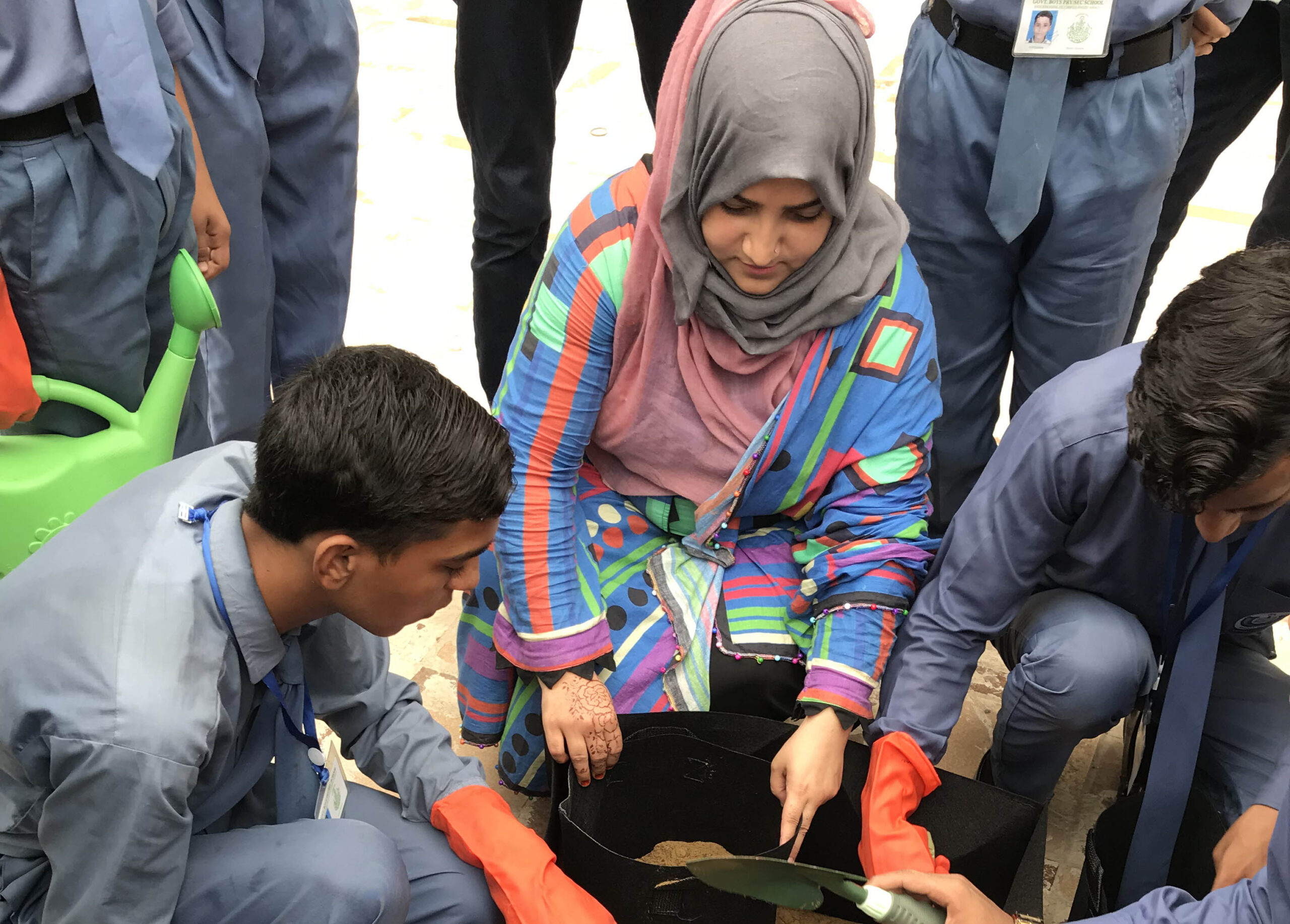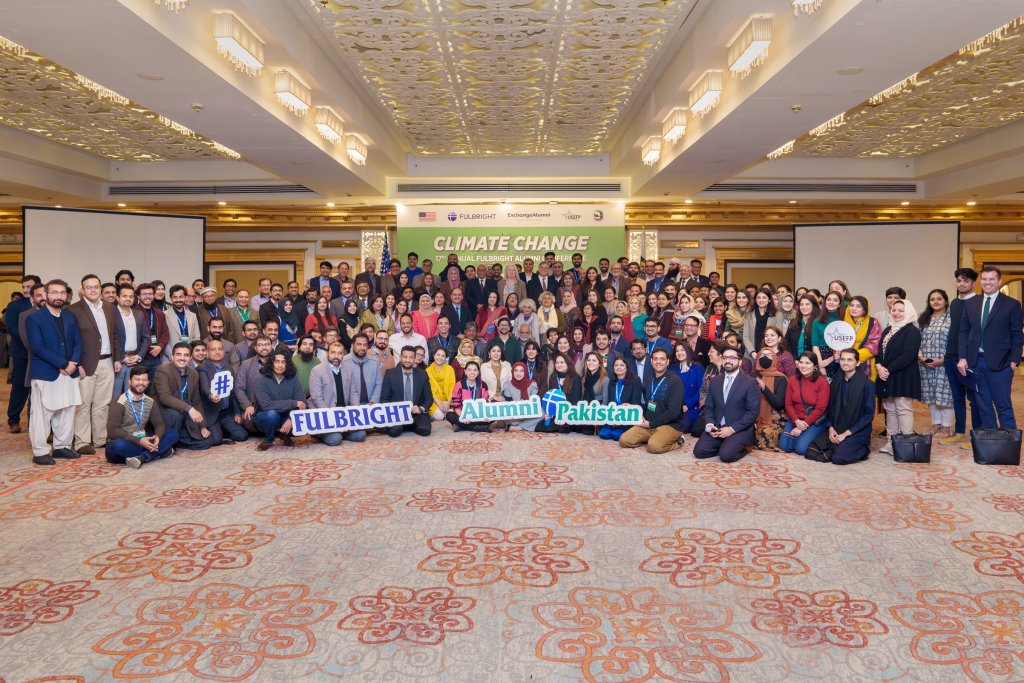
“I Wanted to Test a Novel Approach”
In his first blog entry of the year, Khan describes his project and how his studies so far inspired him to take action.
July 11, 2024
Muhammad Aatir Khan, IIE New Leader
In a country that lies in the top ten most vulnerable to climate change, Pakistan holds a citizenry key to mitigating the effects severe weather disasters. As an education policy expert, Dr. Aatir Khan has seen first-hand the damage these disasters cause education infrastructure. In addition to his work as a professor at the collegiate level, Khan has created programs for lower and higher secondary school students to first learn more about climate change and its effects, and then take concrete actions to mitigate the effects of climate change.
Who are you and what motivated you to become an IIE Centennial Fellow?
My name is Aatir Khan and I work as an Assistant Professor in Social Development and Policy at Habib University in Pakistan. My background is in Public Policy and my primary area of study is education policy and administration.
The education sector is significantly impacted by climate change. When climate disasters hit, there is damage to educational infrastructure. If school buildings are destroyed or damaged, it takes time (and resources) to repair or rebuild them. This disrupts education, more significantly so in the case of public schools and in marginalized areas.
People are often displaced and have to relocate as a result of disasters. This displacement further disrupts education. If people lose their livelihood, children tend to be pulled from schools because they can no longer afford the fees and other costs of living. In some cases, climate emergencies necessitate children going to work to earn and help support their families. There is also an impact on mental health. Even if the school remains open and safe and the child can attend, the trauma of climate disasters results in significant learning losses.
Much has been studied and written about the above and various other impacts to the education sector in the wake of climate change, as well as strategies on how these impacts can be addressed. What interested me more is the inverse – that is, how can we use the education sector to raise awareness about climate change? Academia has begun studying these efforts as well, primarily focusing on adding climate topics into the curriculum so students learn about it in class. This wasn’t far enough for me, I wanted to focus on student engagement and involving local communities to create a space for not just discussing these topics, but for taking action.
The goal of this project is not to solve climate change. It is also not to take “experts” to simply lecture at students. The goal is to provide an avenue for them to come together, talk about the issues, make sense of their experiences, and to give students an opportunity to work with their communities and develop local solutions.

What is your project and what are your goals for it in the next year?
The basic idea behind my project is to create a platform that can be leveraged by students to raise awareness about climate change and empower them to take small actions to address these issues. So, when thinking about this project, I had four key priorities:
- Sustainability – This project is funded for one year, necessitating that I do something that grows beyond and outlasts the fellowship period
- Participatory – I was not interested in a top-down approach where we go to these communities and “educate” them, rather I seek to give them the space to collaborate with us and with each other
- Simplicity – Since I am focusing on public schools and a younger population as a gateway into the community, I did not want to have a complicated intervention or overuse jargons that would distance the project from young students
- Meaningful – At the same time, this would not be a superficial intervention, but one that makes a connection with the students, exposes them to the nuances of climate change and its impacts, and builds a framework for them to be able to take action on their own
After identifying and examining these priorities, I ended up with the idea to establish civic clubs in public schools. There are two key reasons for working with public schools: the scale of the public school system and the current administrative structure of the public schools. With this project I will test the civic club model at public schools to determine that it works, so it can then be scaled up across all public schools and have a larger impact. Secondly, if the model works in public schools, it can easily be adapted (and expanded) for private schools that typically have better administrative structures and resources.
Hence, the key goal for the year is to test this model as a pilot and to share the findings so that it can be adapted and scaled, as needed.
Why is this project meaningful and significant to you?
Pakistan is considered by many international organizations as a country facing extreme climate risk, despite its contribution to global carbon emissions being minimal compared to the other countries. It is a developing country and already struggles politically, socially, and economically, meaning the impact of climate change only worsens the situation.
When it comes to the education sector, there is much work to be done to improve access, quality, and governance. The current physical infrastructure is already lacking in many aspects, and the damage as a result of natural disasters puts developmental projects further behind. Administration is highly centralized and policy decisions are significantly impacted by global governmental and non-governmental agencies, with very limited input from local communities.
Because of these limitations, I wanted to test a novel approach. I think public schools have a lot of potential and can be used to encourage and inspire local communities. For this project, I am establishing civic clubs to focus on climate change issues, but these clubs can take up any issue that students are interested in exploring. They can go on to engage with their community and become a hub for a participatory approach to problem solving. The possibilities are truly endless, and I am excited to see what I am able to do in this year and what becomes of these clubs after the end of the project. The best part is, even if this project faces significant challenges and things do not go exactly to plan, it will still be worthwile for the students that we engage with throughout this year!
Hear more from Aatir below:
Named in honor of IIE’s Centennial and association with the Fulbright Program, the IIE Centennial Fellowship seeks to help enhance Fulbright as a life-long experience and recognize alumni whose work embodies the program’s underlining values of mutual understanding, leadership, global problem solving, and global impact.